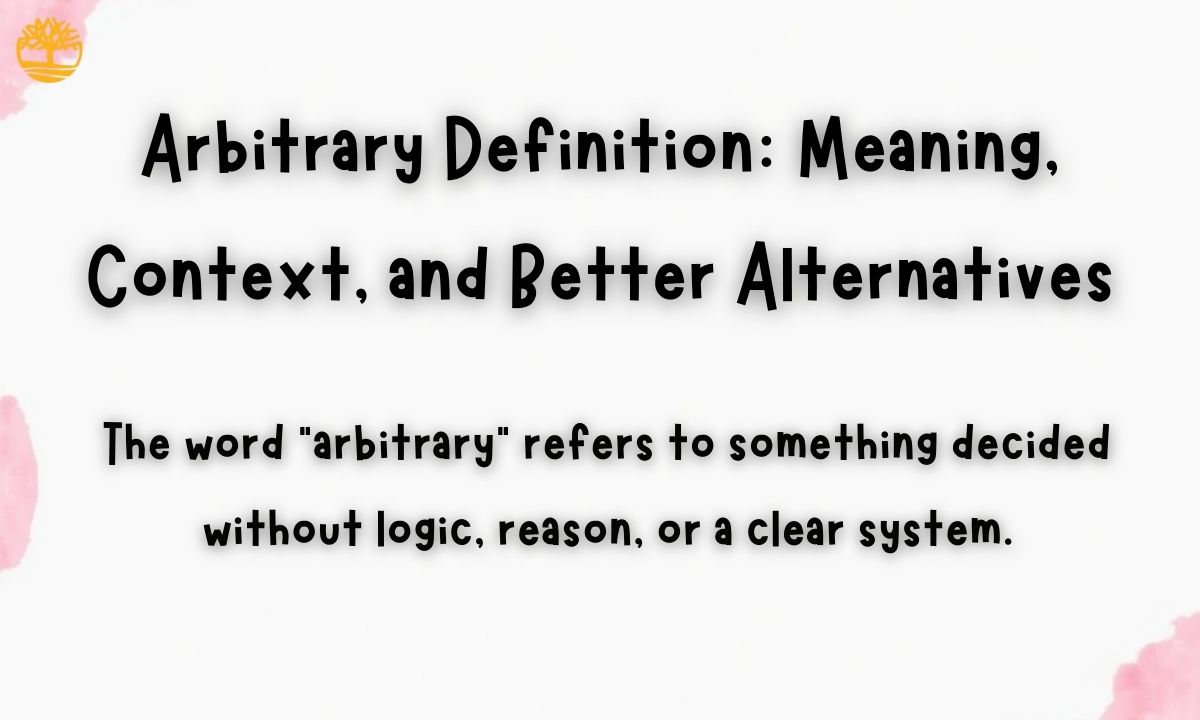Have you ever been frustrated by a decision that felt completely random? That’s where the word “arbitrary” comes in. It describes choices made without clear reason, often leaving people questioning fairness and logic.
The term “arbitrary” carries weight in law, language, and everyday life. It signals actions not based on rules, evidence, or consistency. Knowing its true meaning and better alternatives can sharpen how you understand and use this word.
What Does “Arbitrary” Mean?
The word “arbitrary” refers to something decided without logic, reason, or a clear system. Many don’t know that its use often signals unfairness or randomness. In deeper contexts, it highlights choices shaped by personal will rather than structured rules.
Origin
The word comes from the Latin “arbitrarius,” meaning dependent on one’s will or judgment. It first appeared in English around the 15th century, tied to law and authority. Many don’t realize its roots are linked to judges and decisions made on discretion.
Over time, the meaning widened. Instead of only describing legal rulings, “arbitrary” began to label unfair or baseless decisions in daily life. This shows how the term evolved from authority-driven power to everyday critique of randomness.
Common Uses in Sentences
In everyday speech, “arbitrary” is used to call out decisions that lack fairness. People apply it to rules, punishments, or systems that feel random. Many don’t realize it also appears in academic and legal writing.
For example, a teacher might set an arbitrary rule without reason, or a company may enforce arbitrary deadlines. In both cases, the word signals a lack of logic. Its common use reflects frustration with unjust authority or random limits.
Hiatus Meaning of Arbitrary
An interesting fact is how “arbitrary” links to the idea of a hiatus. When something is arbitrary, it interrupts logic or flow, creating a gap in reasoning. This makes the action stand out as inconsistent or unbalanced.
People often miss that arbitrary choices can pause progress or disrupt trust. Just like a hiatus, they leave a break in fairness. This unique connection shows how arbitrary acts affect both structure and stability in systems or relationships.
Arbitrary in Text: What It Stands For
In texting or casual online use, “arbitrary” is shorthand for random or baseless. Few realize that its casual tone online contrasts sharply with its formal weight in law and philosophy. Context changes its power.
On social media, someone might say a rule is arbitrary to criticize inconsistency. In legal discussions, the same word can describe abuse of power. This dual meaning makes it a versatile yet misunderstood term in modern communication.
16 Better Alternatives to “Arbitrary” (With Examples & Context)
Many people don’t know that “arbitrary” can often be replaced with sharper words that add clarity. Using the right synonym avoids vagueness and strengthens communication. Below is a list of 16 better alternatives, with examples and the context where they fit best.
| Alternative Word | Meaning | Example Sentence | Best Context |
| Random | Without pattern or logic | “The teacher gave a random quiz.” | Casual, everyday use |
| Unjustified | Lacking reason or fairness | “His suspension felt unjustified.” | Workplace, rules |
| Capricious | Sudden, unpredictable | “The boss made a capricious decision.” | Formal, critical writing |
| Illogical | Not based on reasoning | “That rule is completely illogical.” | Academic, debates |
| Subjective | Based on personal feelings | “The scoring felt too subjective.” | Reviews, grading |
| Unreasonable | Lacking fairness or sense | “The fee increase was unreasonable.” | Policies, laws |
| Haphazard | Disorganized, careless | “The plan was put together in a haphazard way.” | Planning, strategy |
| Baseless | Without support or proof | “Her claim was baseless.” | Arguments, evidence |
| Whimsical | Based on sudden fancy | “He had a whimsical approach to rules.” | Creative, playful contexts |
| Unsystematic | Not following order | “The data was collected in an unsystematic way.” | Research, reports |
| Erratic | Inconsistent, unpredictable | “Her behavior was very erratic.” | Behavior, patterns |
| Unjust | Morally unfair | “That punishment felt unjust.” | Ethics, justice |
| Spontaneous | Done without planning | “It was a spontaneous trip.” | Positive, casual settings |
| Groundless | Without foundation | “The rumor was groundless.” | Legal, formal writing |
| Indiscriminate | Without careful choice | “The policy applied in an indiscriminate way.” | Legal, political |
| Unfounded | No basis in fact | “His fears were unfounded.” | Personal, professional |
Tone and Nuance: How to Choose the Right Alternative

Many people don’t know that the tone of a synonym can completely change meaning. Choosing the right word depends on setting, intent, and audience. A thoughtful choice avoids misunderstanding and makes your language stronger.
1. Professional Settings
In workplaces, words like “unjustified,” “illogical,” or “unreasonable” work better than “arbitrary.” They communicate problems clearly without sounding casual or dismissive. The precision of language shows professionalism.
What people often overlook is that professional settings value neutral but firm words. Using a term that feels too emotional can weaken your point. The right choice can highlight fairness and logic without conflict.
2. Casual or Social Media
In casual talk, lighter words like “random” or “whimsical” fit better. These carry less weight and sound natural in conversations or posts. They make ideas relatable without feeling too harsh.
Many don’t realize that slang-friendly synonyms create a tone of humor or playfulness. On social media, language spreads fast, and the wrong choice may sound too serious. Picking softer words keeps the message friendly and engaging.
3. Legal or Academic Contexts
In law or research, terms like “capricious,” “indiscriminate,” or “unfounded” carry more authority. These words have precise definitions that strengthen arguments. They are taken seriously in debates and formal writing.
Few people know that formal contexts demand clarity and credibility above all. Using casual synonyms here can weaken your argument. Choosing the correct term ensures your message is seen as accurate and reliable.
Why “Arbitrary” Can Be Problematic
Many people don’t know that the word “arbitrary” often carries a negative tone. It suggests unfairness, randomness, or lack of structure. This can create tension in discussions, especially in professional or sensitive contexts.
The problem lies in how the word shifts blame without clarity. Instead of pointing out the real issue, it labels a decision as meaningless. Over time, this can lead to miscommunication and mistrust in both casual and formal settings.
Contextual Examples in Different Scenarios
The meaning of “arbitrary” changes depending on context, and that’s something often overlooked. In school, it may describe a teacher’s unfair rule, while in law it signals abuse of authority. Knowing the difference matters.
Here are overlooked ways the term is used:
- Workplace: Describing rules without clear reasoning.
- Law: Pointing to judgments made without evidence.
- Relationships: Criticizing choices that feel inconsistent.
- Academia: Questioning methods lacking structure or logic.
Cultural Sensitivity: Using Alternatives Internationally
Few realize that “arbitrary” doesn’t translate the same way across cultures. In some languages, it directly signals corruption or injustice. In others, it simply means random. This difference can cause confusion.
To avoid missteps, people should choose softer or precise alternatives. For example, “unjustified” or “illogical” may work better in global conversations. Paying attention to cultural nuance helps maintain respect and clarity in international communication.
Frequently Asked Questions
What does “arbitrary” mean in simple words?
It means something done without reason or clear logic, often random or unfair.
Is “arbitrary” a negative word?
Usually yes. It often suggests unfairness, bias, or lack of structure.
Can “arbitrary” be used in legal terms?
Yes. In law, it describes decisions made without evidence or fairness.
How can I say “arbitrary” more politely in business?
Use words like “unjustified,” “unclear,” or “inconsistent” to sound professional.
What does “arbitrary” mean in text or chat?
In casual texting, it simply means random or without reason.
Final Thoughts
The word “arbitrary” carries layers of meaning that many people overlook. It can sound harsh in some settings, yet precise in others. Knowing when and how to use it makes communication clearer.
By exploring better alternatives and cultural nuance, we move toward respectful expression. Words shape perception, so choosing wisely builds trust and understanding. In the end, language should connect, not divide.

Muhammad Shoaib is a seasoned content creator with 10 years of experience specializing in Meaning and Caption blogs. He is the driving force behind ExactWordMeaning.com, where he shares insightful, clear, and engaging explanations of words, phrases, and captions.











